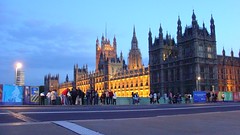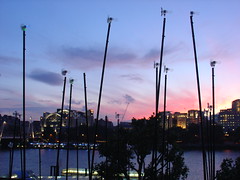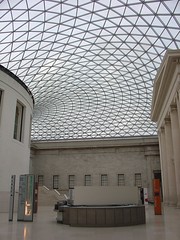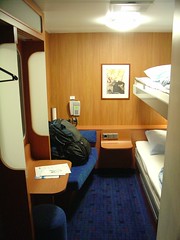Getting off the plane, I felt like I was just in another American airport. That perception was fixed as I turned a corner into a narrow hallway and tried to pass a chap driving a cart on the right. He smiled knowingly and pointed to my left.
The next thing that lets you know you're in London is the CCTV cameras. You begin to understand why both punk and 1984 were born in London.
London's Circle Line Train
I sat next to a business professor on the plane. He was taking his students through London to get an idea of how things work over here. I followed them through immigration and found my own way to the train station. After accidentally getting on the wrong train to London and getting that figured out, I figured out the oyster cards, the underground, and caught a train towards Notting Hill. I was looking for Wake up! London, a hostel I saw in the Europe on a Shoestring guide, but it seemed to be under renovation. My next choice, Leinster Inn, was only a few blocks away.
Leinster Inn was borderline sketchy but pretty great. It looked like a lot of people were staying longer than a few days, and the rooms smelled like something foreign, but it worked out alright. I think there were 10 people on 5 bunk beds in my room.

I grabbed a late lunch, took a nap, and dropped my backpack before returning to central London to walk West down the Thames; starting at the London Eye and walking towards Parliament.
I returned to Leinster Inn for some rest, and met two people. One before I went to sleep: Carlos, an architecture student from Barcelona who came to work on his English; and one as I was falling asleep: Giem, who dropped his jacket on me. It turned out the next day Giem was pretty nice, even if I couldn't understand most of what he said because of his accent. I also met Malcolm, an Australian finishing a few months of travel; he told me how wonderful Porto was.
The next day I decided I'd visit some galleries. To prep, I got breakfast at Natural Cafe, which is one of the kindest and tastiest organic cafes I've been to. The manager saw me looking at the menu outside and gave me a free drink coupon; I got a free mocha and he told me to keep the receipt for next time.
I went first to Trafalgar square and the National Gallery. It's strange how any large open space surrounded by buildings and containing sculpture will draw a crowd. The National Gallery was exquisite. I was most drawn to the Dutch painters they had in the permanent collection, but it's hard to forget Van Gogh and Rembrandt. The Degas were great, but not my favorites from him.
Next I took the underground to near St. Pauls, which I walked by, and over the Millennium bridge to Tate Modern. It was closing early for some reason, so I missed maybe a sixth of it, but eighty percent of what I did see was incredible. My favorites were Giamcometti and Rothko. Giacometti I've never seen in person before, and it's very different when you stand closely to one of his elongated figures and can only focus on the head, while the rest becomes abstract. Rothko was wonderful because there was a centralized dimly lit room dedicated to his large scale work (the "pause" paintings, as I remember them, the stillness/meditative ones with two large holes or stripes).
I walked West from Tate Modern and mingled with the various groups of tourists and listened to conversations: some highschool students, some Americans, a group of friends. Eventually I got to an area called "morelondon", quite the hip and stylized after-work hangout it seemed. There's a Marks and Spencers there, the first I saw — I'm amazed by the idea of a store where every product has the same branding. I got some mixed berries, hummus, and pita bread (or "pitta" over here) and walked over to "The Scoop" (an open air free music venue) where I had a tasty dinner and listened to some popish music.

I walked by the London Eye the day before because I new there was an installation nearby, "Wind to Light", but I should have walked East instead of West. I went back and walked the other direction, eventually finding it and being very inspired. It's interesting how a lot of the installation has fallen apart; I'd be curious to see what it would look like if it actively made use of that process. It also made me think more about how it is a sort of "physical transcoding", with no software in between, and what exactly software is. Software requires abstraction of some form, but to what extent before it is necessarily software?
That evening I finally managed to contact Basia's daughter, Klara, and found my way to their home (all the way to the Ealing Broadway station). I had a wonderful sleep and awoke to Klara's breakfast the next day. After breakfast I worked out the train and ferry from London to Amsterdam for the next day, and took off to the Science Center. I stayed longer than I expected, admiring their history of the steam engine, before grabbing some food from a street vendor and eating on the steps of the fountain outside Buckingham palace.
Another time-honoured English tradition, I returned to Basia's to watch "Big Brother" with Klara and two of her friends. Stefan came downstairs and we ended up talking philosophy until Basia got home from the opera, at which point we, of course, went outside and talked opera. Except I mostly listened: as Basia's friend pointed out, the US does not have an Opera tradition.
I wasn't sure about how I felt about London when I first arrived, it's a bit like New York City's younger brother, but how can you not love people who use phrases like "with the faeries" (not all there) and have headlines like "Yanks take Mickey out of Becks and Posh"?




